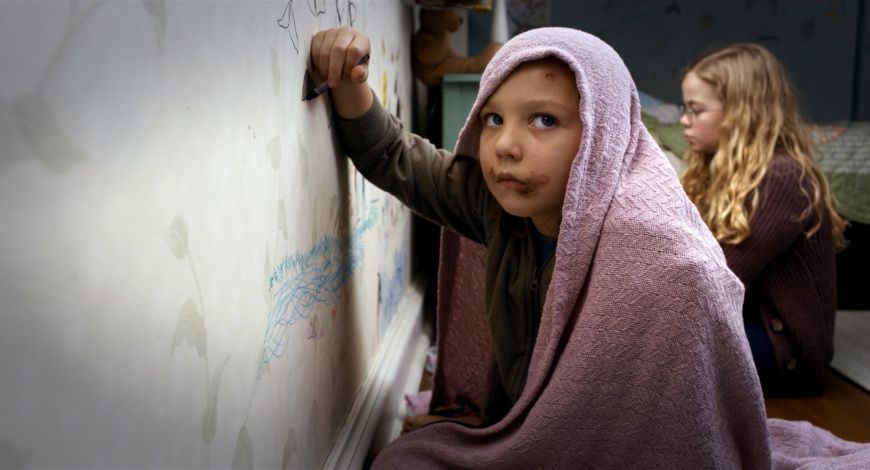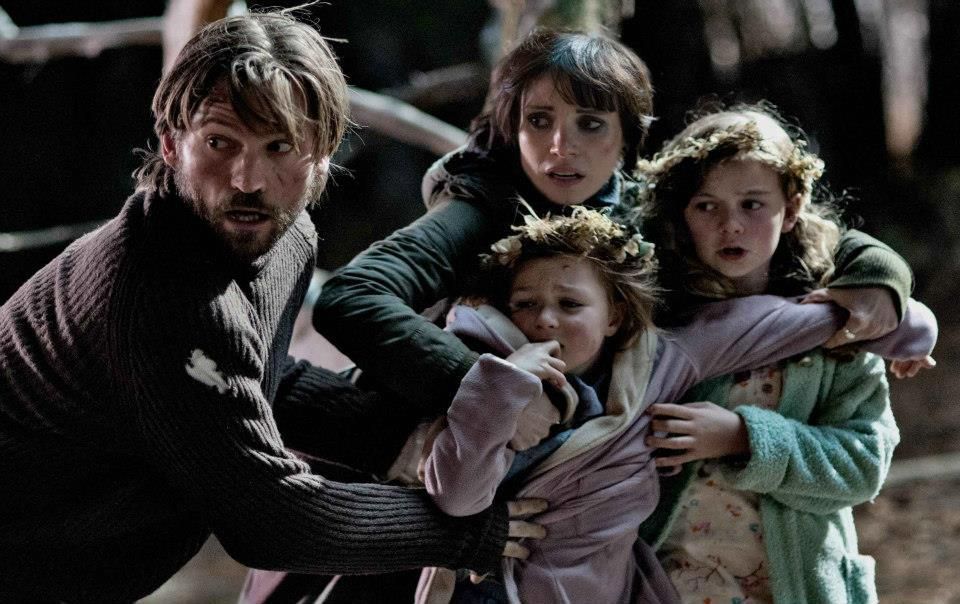Director Andres Muschietti considers himself a planner, and points to the long opening scene of his feature debut, Universal Pictures’ supernatural thriller Mama, as evidence.
The sequence centers on the abandoned car of a man who kidnapped his two young daughters, who are discovered five years later as feral children living alone in the forest, claiming a being named “Mama” cared for them.
“The opening should be something that should be gripping from the very first frame and all the action in that sequence was very carefully planned, and I think, successfully executed,” Muschietti told a gathering of reporters, where he was joined by his sister and co-writer Barbara Muschietti and producer Guillermo del Toro.
“I think Andy was encouraged by Guillermo to always move the camera,” Barbara Muschietti suggested.
“Cattle prodded!” del Toro added with a grin. "But in a brilliant way -- not the cattle prodding, the movement. The cattle-prodding was not brilliant.”
Praising the young director’s aesthetics, del Toro said, “Andy has a sense of style you can feel from the short. … I’m a big fan of his opening shot, which is gorgeous and ominous in a beautiful way. We open with the line ‘Once upon a time,’ and then you go to present day and it’s Hansel and Gretel, it’s a father who lost everything taking his children to the woods to finish their lives. It’s exactly the opening of a fairy tale.”
Based on Muschietti’s 2008 short film of the same name, Mama stars Nikolaj Coster-Waldau (Game of Thrones) as the girls’ uncle and Jessica Chastain (Zero Dark Thirty) as his girlfriend, who take in the two orphans only to discover that the ghostly Mama who cared for them is real, and she isn’t about to allow her “children” to be taken without a fight.
Mama also shares a major theme with del Toro’s 2010 film Don’t Be Afraid of the Dark, as both stories are about women reluctant to embrace motherhood but thrust into a situation where they are responsible for children.
“We came up with the story together over a couple of sessions, but it’s really that element, which is as strange as hell, that came from them,” del Toro said, adding that the choice to produce another female-centric film was a coincidence. “They didn’t know I was doing that in Don’t Be Afraid. I didn’t tell them, ‘I would love to do that.’”
However, he feels there’s a significant divergence between the two films when it comes to execution. “The big difference for me is from the moment we started, and Jessica was so happy about this, she never becomes a mother,” del Toro said. “She becomes a fellow female, there’s solidarity, but she never becomes possessive or a mother figure.”
“It’s the story of a woman struggling with motherhood -- literally, hand-to-hand combat with motherhood!” he added. “And it’s the idea that there are other alternatives to the love of a mother and the way we see the world and her making peace with the fact that she can love someone in a protective way but not in a suffocating way.”
Another similarity between del Toro’s other films and Mama is that children are in danger from supernatural forces. “I remember what [actress] Ivana [Baquero] told me about Pan’s Labyrinth when we shot the impalement scene, which is a very intense scene, and she saw the movie she said, ‘You know what’s funny? That scene was fun to shoot, hard to watch,’” Del Toro recalled. “Kids shooting horror, they love, they’re having fun! They don’t like watching it so much.”
“The first thing about getting great performances from kids is finding the right kids,” director Muschietti added, praising the young actresses who play the feral girls Victoria (Megan Charpentier) and Lilly (Isabelle Nelisse).
“One [Nelissa] was instinctive, the other [Charpentier] was trained and tried to mimic adults, so my relationship with her was different as I would speak to her as I would any adult actress because that’s what she wanted,” Muschietti said, adding that the differences in training perfectly matched the characters they played. “They related so much to their character onscreen because Victoria is a girl that knew human life, and the other one is totally imprinted by Mama.”
Turning to Mama’s design, del Toro joked that he wished he could take credit for the monster, but her look was all Muschietti’s creation.
“Mama is something [Andres] wanted to do exactly the way he did it from the short,” he said. “The only thing I said about Mama was the teeth, I said, ‘Make them thin and long and small because that’s creepier.’ The rest Andy came in with Mama fully formed.”
Del Toro said what appealed to him about Mama was how grounded in reality the ghost story is. “What I love about Mama as a project, and it was there in the short from the beginning, is a great construction of a character, not just a ghost,” he said.
Explaining that the film could be broken into “three stages” of Mama’s development, he continued, “We do one where the girls talk about her and before you see her, like they did in the short: ‘Don’t look at her. Mama is back.’ It implies a lot, it implies a will and a personality on the ghost before you show it. Second stage is the speech of the old lady saying a ghost is a twisted emotion ... then you see a shadow, you hear a noise, the closet door opens, and by the time you reveal Mama you already have so many emotions and ideas about her, when she personifies them in that scarecrows of a figure it’s super-scary.”
“Andy had the control to show just enough [of Mama] I would have been like, ‘Let’s go!’” del Toro laughed. “Argentineans are much more controlled than Mexicans!”
“I couldn’t explain it better,” Muschietti joked.
Del Toro compared the ghost in Mama to his next directorial project, Universal’s recently announced Crimson Peak, calling the two films’ spirits “very different.”
“You can find as subtle a ghost story as ‘The Friends of the Friends’ by Henry James to brutal, scary ghost stories or an antiquarian feeling love story,” he said. “There are so many flavors. Ghosts are a metaphor that is so prevalent and can be interpreted in so many different ways, there’s no ending to what you can do.”
Del Toro characterized his haunted-house thriller Crimson Peak as “very, very classic, but at the same time very irreverent with the classic.” “Mama has a very incredibly strong base of reality, like the emotional reality and even the art direction, there’s an aspect where the house feels real -- I would go more fantastic, I would go crazier,” he said. “Crimson Peak is a complete confection, it’s like a gothic romance confection, it’s candy, it’s a piece of cake.”
A producer on releases ranging from horror films like Mama to DreamWorks Animation’s fantasy-adventure Rise of the Guardians, del Toro explained his process for selecting what to produce and what to direct is pretty chaotic.
“To direct is harder. People think that you see it like the Godfather, waiting for people to come in, ‘Oh, so you bring me a project today!’” del Toro joked, miming smoking a cigar and waving his hand as his creative cohorts laughed. “It’s not that. You’re hustling, you’re desperate, you’re panicked, you’re horrified, the movie you think you’re going to do next you don’t do, the movie that you think you’ve never going to do you make! A career is what happens when you’re making other plans.”
As for what grabs his attention as a producer, “I only produce things that have so much in common with what I like ... and at the same time I produce only movies that have something stylistically different so I can learn from the experience of producing,” del Toro said, citing a trick for rigging stairs Muschietti employed on Mama as part of that learning curve.
“He shot it upside down with the stairs on top and Lucas at the bottom, and he put them on a swing and he would have [the actor] moving on a platform and the steps would hit him, and I was like, alright!” del Toro said, miming writing the idea down as the Muschiettis laughed.
But del Toro said his greatest producing joy comes from working with new talent and new directors.
“They come in and they don’t think, ‘Oh, I can’t do that.’ They come in and they go, ‘Fuck it!’” he said. “That adventure and that kinship is what makes you commit to produce.”
Mama opens Jan. 18.




